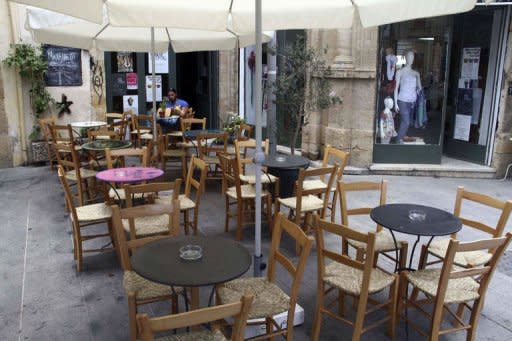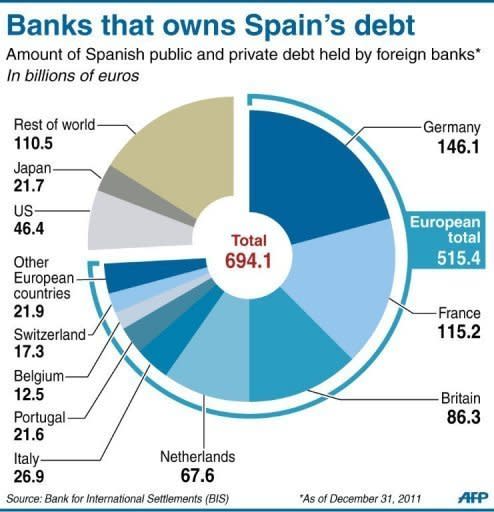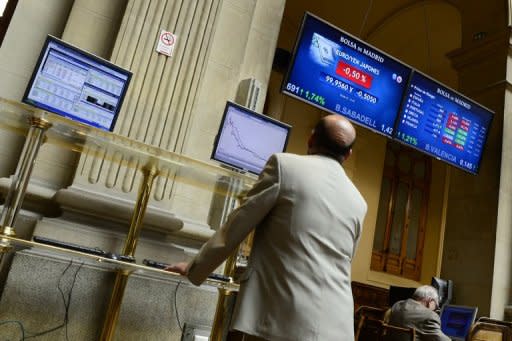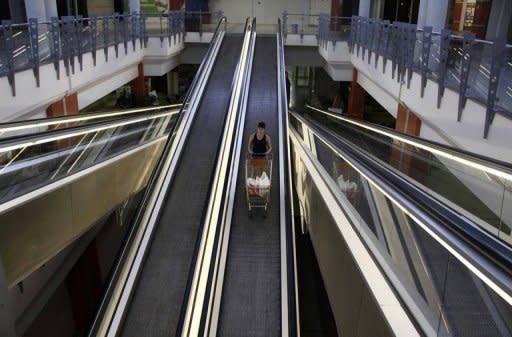Spain banks' ratings cut as Cyprus asks for bailout
Spain suffered a fresh blow as 28 of its banks were hit with credit downgrades while Cyprus became the latest eurozone country to request a rescue loan, days ahead of a pivotal European Union summit. The Moody's decision to slash the Spanish lenders' ratings came just hours after Madrid made a formal request for cash to bail out its troubled banking sector. The agency said it slashed the ratings because they faced rising losses from commercial real estate loans, adding that Madrid's own lowered credit grade was a contributory factor. Spain's lower creditworthiness "not only affects the government's ability to support the banks, but also weighs on banks' stand-alone credit profiles", the agency said. Moody's said, however, that it "views positively the broad-based support measures being introduced by the Spanish government to support the Spanish banking system as a whole". Consultants hired by Madrid have estimated that the banks -- hobbled by huge, reckless loans that turned sour after a property bubble imploded in 2008 -- need up to 62 billion euros in capital. Eurozone finance ministers have offered up to 100 billion euros $125 billion) for the country's lenders. Madrid's request came at a key moment in the eurozone crisis after debt markets sent Spanish and Italian borrowing rates spiralling and raised concerns for the future of the currency union. A full-blown bailout for Spain, the fourth-largest economy in the eurozone, would dwarf the rescues of Ireland, Greece and Portugal and strain the resources of the bloc to the limit. Spain's banking distress will be the focus of a meeting of eurozone finance ministers on July 9. "The purpose of the required assistance is to contain the risks to the Cypriot economy, notably those arising from the negative spillover effects on its financial sector, due to its large exposure to the Greek economy," the statement said. The government in Nicosia has faced difficulties with public finances and the country's banks took a major hit from a writedown of Greek bonds agreed earlier this year to ease the burden on Athens' finances. Eurogroup head Jean-Claude Juncker welcomed the Cypriot application but said he expected it to act with "strong determination" to carry out the economic measures required for an EU bailout. When they meet on Thursday and Friday, EU leaders will consider deepening economic and monetary union to finally overcome the debt crisis that has wracked the eurozone for two years. Markets were sceptical however that they would be able to overcome their differences to take significant steps. London stocks fell 1.14 percent, Frankfurt dropped 2.09 percent, Paris sank 2.24 percent, Milan tumbled 4.02 percent, Madrid plunged 3.67 percent and Athens tanked 6.84 percent. Asian markets were also lower on Tuesday, with Tokyo off 0.73 percent, Hong Kong slipping 0.14 percent, Sydney losing 0.46 percent, Shanghai down 0.52 percent and Seoul 0.28 percent off. Spanish Prime Minister Mariano Rajoy urged the summit to set a schedule to gradually advance towards integration, and renewed his call for the creation of a eurozone budget authority. European leaders also face demands from Greece's new three-party coalition government for different terms for its bailout, including a two-year deadline extension on reforms. But German Chancellor Angela Merkel's spokesman Steffen Seibert warned that no decision would be taken until an international team of auditors had assessed the state of Greece's economy. A team from the European Union, IMF and European Central Bank postponed a visit to Greece originally set to begin Monday due to the health problems of Greek leaders. No new date has been set. However, adding to the uncertainty around Greece was news that the bank chairman who was to become finance minister in a new government turned down the job on Monday owing to what a spokesman said was a "chronic" condition. That came as Prime Minister Antonis Samaras was released from hospital, two days after surgery for a detached retina, although he has been told to stay at home for at least a week to recover. US President Barack Obama, wishing Samaras a speedy recovery Monday, urged him to work closely with European leaders and world finance bodies to push forward his country's reform programme.





